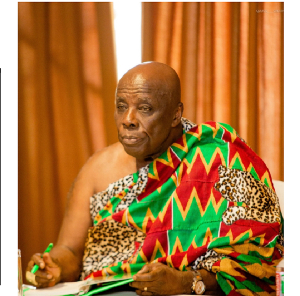 Okyenhene, Osagyefo Amoatia Ofori Panin
Okyenhene, Osagyefo Amoatia Ofori Panin
The Eastern Regional House of Chiefs has called for immediate action to curtail the adverse effect of illegal mining activities in rural parts of the country commonly known as galamsey.
Expressing alarm over the proliferation of illegal mining (galamsey) in rural communities, the chiefs denounced its adverse effects on the environment and public health.
The Chiefs in a communique issued after a two-day training workshop at the Royal Senchi Hotel and Resort on September 24 and 25, 2024, urged the government to engage meaningfully with them and to consider their suggestions for effectively tackling this pressing issue.
The country’s forest cover has witnessed a fast depletion in recent times due to illegal mining activities and the chiefs believe involving them in the fight could lead to the desired results.
This inaugural event brought together 11 paramount chiefs and traditional council leaders under the theme “Training on Matters Relating to Chieftaincy,” aimed at equipping members with essential knowledge regarding chieftaincy issues, legal frameworks, and dispute resolution.
The chiefs emphasized the need for government action to safeguard natural resources and uphold cultural values within the community.
The communique released on September 25, also outlined key resolutions reflecting the collective concerns and commitments of the chiefs.
Plea for peaceful national elections
The chiefs urged major political parties and their supporters to prioritize peace, order, and respect for each other’s rights during the upcoming elections.
They called on political leaders to discourage the use of inflammatory language and gestures, emphasizing the need for goodwill and harmony among all party members.
Support for national development efforts
The chiefs reaffirmed their commitment to collaborating with the government to enhance education, healthcare, and economic empowerment in Ghana.
They also urged more meaningful engagement from the government regarding national decentralization projects to ensure real benefits for local communities.
Promoting peace and cohesion
The chiefs encouraged all Ghanaians, particularly those in the Eastern Region, to foster unity, tolerance, and peaceful coexistence within their communities.
Upholding justice
Committed to social justice, the chiefs pledged to advocate the rights of marginalized and vulnerable groups, ensuring that their communities are fair and just.
Strengthening family values
The importance of shared Ghanaian family values was emphasized, with the chiefs vowing to uphold culturally rooted norms that bind society together.
The workshop concluded with the election of new officers to lead the House for the next four years. Nene Sakite II (Manya Krobo) was re-elected unopposed as President, alongside Daasebre Akuamoah Agyepong II (Kwahu), who continues as Vice President.
Additionally, three members— Okotwaasuo Kantamanto Oworae Agyekum III (Akyem Bosome Omanhene), Osagyefuo Amoatia Ofori Panin, (Okyenhene) and Odeneho Kwafo Akoto III (Akwamuhene) —were elected to represent the House at the National House of Chiefs.
The event marked a crucial step toward strengthening the role of traditional leaders in governance and community development, fostering unity and cooperation among the chieftaincy institutions in the Eastern Region of Ghana.